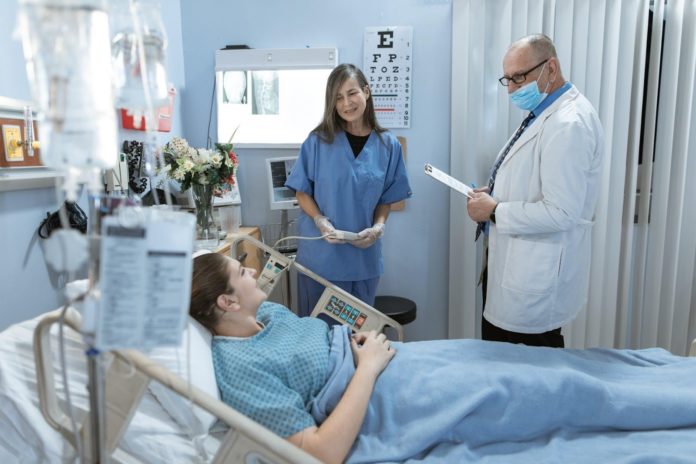The benefits of better and effective communication in healthcare are often undervalued and remain unseen. Excellent communication is like an art that involves creating a human connection with patients or healthcare team members.
Different tools and technology are used to facilitate such human connections. Every individual is a social being and needs care from others, especially when most vulnerable. With healthcare facilities typically employing more nurses than physicians, nurse professionals are probably the ones that offer patients the empathy and compassion required on the path to recovery. Care is delivered to every patient primarily through dialogue and verbal and non-verbal communication skills.
Communication in healthcare indicates exchanging thoughts, feelings, and critical information through speech and other means. Patients convey their distress, fears, and concern to their caregivers to help them establish the correct diagnosis. As a result, the benefits of healthcare practitioners effectively communicating is pretty important.
Advanced Learning in Healthcare
Effective communication in healthcare demands a better understanding of patients and the experiences they share. Healthcare providers such as nurses should always be prepared to understand, learn, and implement different aspects and applications of better communication in various healthcare fields.
Emphasis should be placed on effective communication between nurses and their patients. Nursing education should focus more on the communication skills of every nurse professional. Healthcare is an ever-evolving and dynamic field, and now more is expected of every nurse leader.
AACN (The American Association of Colleges of Nursing) has declared a doctoral-level education a requirement for all advanced practice nursing. Various nursing institutes are now offering online DNP programs that put MSN-credentialed nurses at the forefront of the healthcare industry.
It helps prepare nurses for leadership roles, advanced nurse education, better patient care, effective communication, and shape future healthcare policies and procedures.
Effective Communication in Healthcare
Patient communication is rarely unidirectional, and when caregivers fail to understand two-way communication, it leads to negative attitudes and conclusions.
However, it’s not necessary for the communication to always be verbal. It can be done without words and is a continuing process. Non-verbal communication involves facial expressions, posture, gestures, and physical barriers like distance.
Nurse professionals offer patients deep intellectual, interpersonal, technical skills and abilities while caring for them and beyond. To achieve that, nurses must possess much more than just clinical expertise. They require interpersonal communication skills. Communication in the healthcare profession is a vital element helping in each activity area and its interventions such as disease prevention, treatment, rehabilitation, therapy, education, and most importantly, health promotion.
Every nurse professional should evaluate patient communications during every stressful situation and understand non-verbal signs to ensure their patient’s safety. In addition, these caregivers must understand that no two individuals communicate in the same manner.
Active listening is essential in communication. It allows healthcare providers to assess every situation to generate a better response for care.
Benefits Of Effective Communication in Healthcare
The most common benefits of effective communication in healthcare include the following:
1. Quick Understanding of a Patient’s Needs and Conditions
From the beginning of triage, patient care, treatment, discharge from an acute care environment, and beyond, nurse professionals are the primary and first healthcare providers. These caregivers promptly assess, analyze, and try to understand a patient’s overall condition. In almost every case, these nurses are the initial and best line communicators regarding patient health status to other caregivers. Their ability to communicate effectively seems critical in providing better care to patients.
2. Understanding The Emotional Side of Every Patient
Nurse professionals spend more time with their patients than many other healthcare providers. So, the extent of personal communication these nurses have with patients is vital for understanding their physical and emotional wellness. Every nurse’s communication with patients indicates they may offer a deeper level of healthcare individually. Such crucial information can be very significant in a patient’s health for a more extended period. The improved level of communication can also help make decisions on a patient’s appropriate treatment plan and when you attempt to implement care protocols with various healthcare professionals.
3. To Understand the Social Determinants of Overall Health
Social determinants of any person’s health include environmental, social, and physical conditions that influence their overall health status. Poverty, food insecurity, unemployment, and lack of permanent housing are social determinants. They have increased severity and chronic health conditions leading to higher morbidity and mortality. Effective communication with patients can help caregivers understand their social determinants and significantly improve patients’ overall health and well-being.
4. Tracking All Changes in Healthcare
Understanding patients’ concerns and needs enable nurse professionals to target their clinical strategies and communication toward particular patient preferences. Doing so also indicates nurses can track patient health progress regularly, calculating deviations in real-time. Health outcomes based on routine communication will then be transferred to other healthcare providers on the team. Nurses who are great listeners and frequently check in on each patient can effectively reduce their physical and emotional distress.
5. Recognizing Specialized Needs
Often a patient requires care outside the medical facility. For instance, some patients follow specialized diet plans or have particular religious beliefs. Through better communication with such patients, nurse professionals can ensure such information is forwarded to the right caregivers so that the healthcare quality isn’t compromised. Also, they help ensure each patient’s requirements are effectively met.
6. Advocating For Your Patients
Patient advocacy involves therapeutic communication and relationship between nurses and their patients. As patient advocates, nurses act as healthcare informers to their patients’ decision-making, supporting and allowing patients to make better decisions. Nurse advocates fill communication gaps between patients, other healthcare professionals, and the entire healthcare system. Similarly, when these nurses recognize their patients’ distress, they help alleviate fears and provide an excellent experience for their patients. Additionally, nurses offer reassurance and support for their patients. They can easily explain a diagnosis, recommend taking medications, or allow their patients to follow a better treatment plan. Also, these caregivers follow up with doctors for various things such as lab results or any critical patient information.
Conclusion
Healthcare communication goes much far beyond just communicating with patients and other caregivers. Nurse professionals are frontline communicators. Equipping every nurse with the right technology, tools, and skills will improve every healthcare organization. To accomplish these objectives and patient satisfaction, better communication skills by these caregivers require excellent interpersonal skills, training, understanding of patients’ needs, and continuing education. Effective communication in healthcare includes a compassionate and balanced approach, clinical expertise, and active listening. Proper technology is also essential to meet demands by developing a quality healthcare encounter to support patients’ physical and emotional needs.










